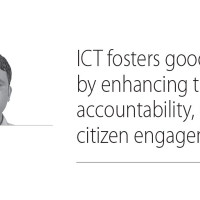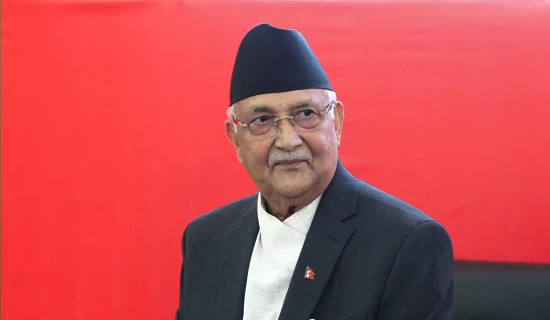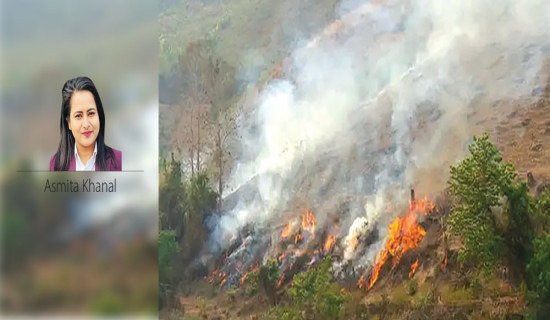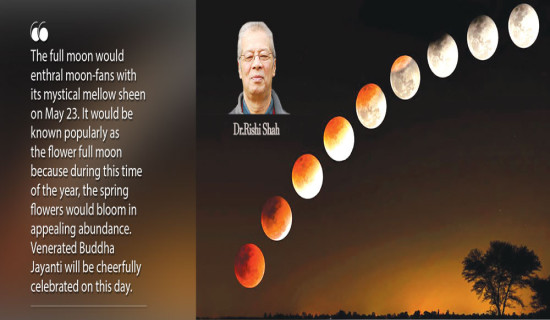- Friday, 3 May 2024
Iran, Israel On Notice
Announcing that the myth of Israeli invincibility was over, Iran rained on the Jewish state swarms of drones and missiles last week. Most of the missiles were successfully intercepted by Israeli defence system. Jordan, probably with the United States’ assistance, downed some of them as they flew over the Arab kingdom’s air space. Despite the US describing it as a pariah state, Iran announced that it had arrived, well-prepared with sophisticated weaponry and powerful fighting capability. The confidence was exuded in the “Operation Honest Promise” strikes on Israeli defence installations.
A coalition of the United States, the United Kingdom and France stepped in to down many missiles heading for Israel. It is believed they used their bases in Jordan and other states in the region. Saudi Arabia and UAE, too, are reported to have assisted the allies against Israel. Tehran launched the missiles 13 days after Israel attacked its embassy in Syria’s capital Damascus, in which about a dozen Revolutionary Guards, including two generals, were killed. People thronged the main thoroughfares in Tehran and other cities in celebration of the revenge attack. Israel’s Prime Benjamin Netanyahu pledged to respond fittingly.
Israel warned that it would respond “significantly”, even as its close allies, including the United States repeatedly asked for restraint. Less than a week later, Tel Aviv made some token attacks that hardly caused any substantive flutter. For that matter, Tel Aviv and Washington seemed to parry making elaborate official comments on Israel’s “revenge” response.
Rapid action
The Muslim world’s most powerful state today, Iran had vowed to avenge Israel’s deadly assault on its diplomatic mission. Its supreme leader Ayatollah Ali Khamenei announced that the “evil regime will be punished”. The revenge attack was expected to reassure Iranians and to convey a message to both Tel Aviv and the rest of the world that Iran would not stay still without an appropriate response. Tehran waited for 13 days to abide by international regulations before triggering the strike. Even as the US’ President, Joe Biden, pledged “ironclad” support to Benjamin Netanyahu, his Russian counterpart Vladimir Putin reacted with a “won’t sit & watch” if the US intervened militarily.
While putting Israel on notice, Iran warned the US and the UK against supporting Israel. That was an indication of risking a showdown between Tehran and Tel Aviv in real earnest. During the first few hours of the conflict, the US swung into action to prevent an escalation of the conflict. Biden and Netanyahu had a long telephone conversation. Tel Aviv, meanwhile, moved the United Nations Security Council for a meeting on the conflict, whereas the numerous oil-importing countries have begun making contingency plans for supply shortage. As expected, the UNSC meet was divided over the conflict. Russia condemned the “hypocrisy” echoed at the meeting that ended without any substantive decision and the US was critical of Iran.
The brief six-day Arab-Israeli war in 1973 led to hike in oil prices that hit the roofs. Its economic repercussions and political implications were worldwide. And the international community recognised that oil could be weaponised and its producers emerged as strategic forces. Washington might be wistful of the good old days when the Shah was someone who Washington could be banked upon to sign the cheque on the dotted line. In exchange, the imperial regime was not hindered in its style of governance. Anti-Shah groups nursed a long memory regarding the manner in which Washington protected and patronised him. They gave vent to their displeasure within months after the 1979 revolution compelled the Shah to abandon the throne and flee to live in exile.
On November 4, 1979, Iranian students seized the embassy and held as hostages more than 50 Americans, ranging from the Chargé d'Affaires to junior staff members. The hostages’ ordeal ended after 444 days just about the time Ronald Reagan was being sworn in as the US president. By the end of the same year, Soviet troops entered Afghanistan, Iran’s neighbour. Eight months later, Iran-Iraq war broke out. Washington supported Saddam Hussein for the next eight and a half years until the war ended in 1988 but without a clear winner.
Even if isolated by the West and its allies for four and a half decades, and having been imposed relentless sanctions, Tehran improved and expanded its defence in addition to rolling its economy at a steady pace. Israel has emerged as a formidable force in West Asian landscape, thanks also to the US backing that ensures the Jewish state as the single-largest beneficiary of American aid and soft loans since the Jewish state’s independence 75 years ago. “We are seeking all options,” said Netanyahu after a war cabinet meeting. Keen to prevent any escalation of the conflict, Biden tried talking him out of any major retaliatory action.
On guard
Even as Iranians celebrated the first attacks on Israel, at least three Arab nations — Jordan, Kuwait and Qatar — issued directives to the military bases of the US on their soil not to use their airspace and soil against Iran in support of Israel. Oil fields could be Tehran’s target, if any Arab nation was seen siding with the attackers. Tehran is unlikely to forget Arab states’ siding with Tel Aviv and downing Iranian drones missiles bound for Israel. How and when payback time will arrive from Iran is a matter of speculation. Probably no open assault will be let loose, whereby only the needle of suspicion might be pointed without any definitive identification of the perpetrator or provocateur.
When it comes to throttling those that don’t toe the lines they draw, powerful neighbours or far-off major powers exert immense pressure on a weaker state, individually or through joint efforts of close allies. The victim pretends to hold its post firmly. The big do deals with the devil; the middle level powers hem and haw before tilting towards one or the other bigger powers; and the weak resign to deep apathy or engage in deafening silence.
Big powers and intimidating neighbours are all tarred by the same brush. Chasing conflicts and controversies is both absurd and dangerous at a time when the world political landscape senses the tremors of major changes in ideological shifts and power equations. This month’s Iran-Israel confrontation marks yet another writing on the wall that a new world order is irreversibly in the offing. The change should be palpably felt within the 2020s.
(Professor Kharel specialises in political communication.)
















